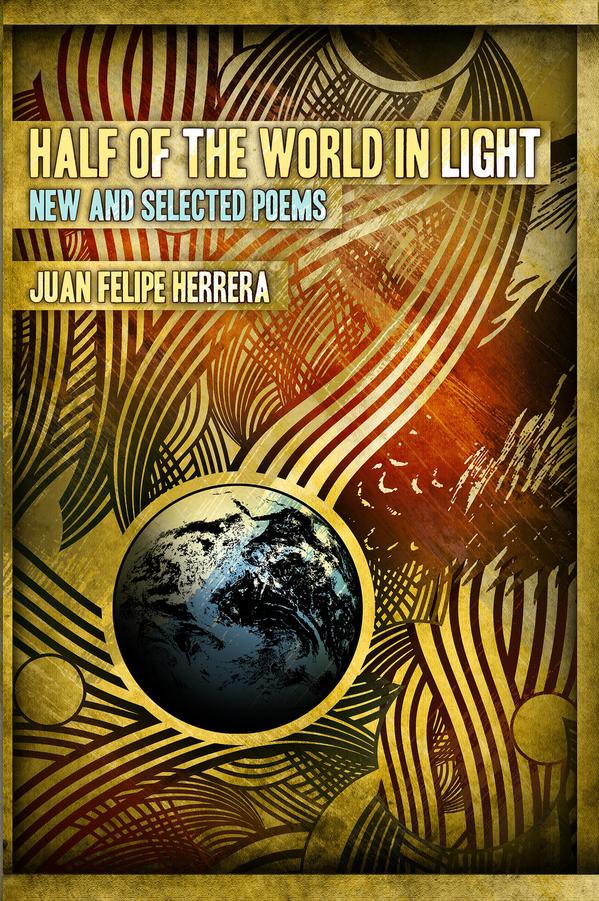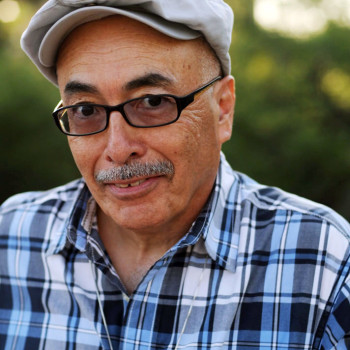Poet, performer, teacher, and activist Juan Felipe Herrera‘s work is known for its exuberance, it’s experimentalism, and it’s focus on cultural identity. He’s written over a dozen poetry collections, including “Half the World in Light: New and Selected Poems,” which earned him the National Book Critics Circle Award.
Born in 1948 to migrant workers in California, Hererra was the poet laureate of the Golden State… until two weeks ago, when he was named poet laureate of the entire country — the first Latino to ever hold the position. Brendan kicked things off with Hererra by asking if laureates receive actual laurels.

Juan Felipe Herrera: Well, the wreath of laurel is all the beautiful people that have been greeting me and celebrating, and being so excited, running around their houses and rooms and shouting out, and just supporting me, and being ready to write and express themselves, and come together. So, that’s the wreath right there.
Brendan Francis Newnam: So, you grew up in California. You’re the son of California migrant workers. I wonder, what did your parents think about you becoming a poet?
Juan Felipe Herrera: I’m an only child, so I was given extreme freedom.
Brendan Francis Newnam: So, they had no problem with it at all? They just wanted you to kind of follow your bliss and…?
Juan Felipe Herrera: Yeah, they wanted to follow my bliss, to find my bliss, but I never really said I was a poet or stood up in the middle of the kitchen and recited a poem even though my mother would do that.
Whenever she felt an inspiration, a lightning bolt, she would stand up and recite a poem, and what we call in Spanish “declamación,” where you kind of sing out. You shout out. You do your own home-style spoken word, and you lift your arms, and you wave your hands, and you bend your body, and you get this interesting look on your face as if you’re announcing to the community the coming of a new season.
So, that’s what she used to do, so I guess I just… I kind of just thought about it and felt it, and did it outside.
Brendan Francis Newnam: Well, I want to play a clip of you doing your own sort of declamation. It’s from a reading you did a while back of one of your more celebrated poems. It’s entitled “187 Reasons Mexicanos Can’t Cross the Border.”
So, that clip captures your sense of humor, your taste for performance, your interest in political themes, and specifically, the Chicano experience. How did that poem come to be? Do you remember?
Juan Felipe Herrera: Well, it was the early ’90s when we had Proposition 187 that was all about cutting back and cutting off services for undocumented brothers and sisters here in California, so I took that number, 187, and wrote 187 lines of reasons why. Because that’s what it was. That proposition proposed reasons why we could not receive services.
Brendan Francis Newnam: Yeah.
Juan Felipe Herrera: And so, my poem was… I kind of clarified those reasons as a poet in that poem.
Brendan Francis Newnam: It’s a pretty political poem with a specific point of view, and now, as poet laureate, you’re representing the entire country of people, including those who have a different view of immigrants. I wonder what your thoughts are on broadening your scope.
Juan Felipe Herrera: Well, my scope is broad. I’ve always been open to — and continue to be, and will be — open to all points of view.
A poem is a flexible thing, and a poem is a poem.It’s not a report. It’s not a piece of research necessarily, and it’s not an article, and it’s not an essay, although it shares all those things.So, a poem is to be examined and maybe appreciated kind of in 10,000 ways. At the same time, you’re right. I look forward to including more and more and more and more, and zillions of ways of looking at things, and I believe in that.

Brendan Francis Newnam: Also, in that reading you can hear a bit of Allen Ginsberg, one of your mentors, and he had an anti-establishment streak.
You kind of have the same streak, and poets in general are often thought of as, you know, bohemians, outside observers, reporters. The position of poet laureate seems to run counter to that. Being an official poet seems kind of oxymoronic.
Juan Felipe Herrera: Well, bohemians wear a lot of colors, wear a lot of berets, a lot of hats, and a lot of skirts, and a lot of belts, and instruments, and so it’s OK. No, it’s a good thing. It’s a good thing for poets, as we have always been, and artists, as we have always been, and human beings, as we have always been, to walk many trails and cross many mountains, and embrace all rivers, embrace all stars, and that’s how poetry’s written.
If we just limit ourselves to a tiny space, that poem is going to… it’ll be starving. It’ll be a starving poem. A poem needs a lot of, lot of nutrients, so the more places we go, the better.
Brendan Francis Newnam: I think your answer just gave us a window into your writing process [Juan laughs]. OK, well, we have two standard questions that we ask each of our guests.
Juan Felipe Herrera: Oh, yeah?
Brendan Francis Newnam: And the first one is: tell us what question you’re tired of being asked.
Juan Felipe Herrera: Well, to tell you the truth, I really love all questions. I know it sounds mushy because,
I’m a new guy every day, and it’s a new moment every day. And it may be the same question, but I’ll have a different answer.So… it’s OK. I get to expand. I get to add another stanza to the poem of that question.
Brendan Francis Newnam: I wish I had your enthusiasm for each new day [Juan laughs]. Our second question is: tell us something we don’t know, and this can be a personal fact about you that you haven’t shared in interviews or just an interesting kind of piece of trivia about the world.
Juan Felipe Herrera: Well, about me, I guess it would be: one of my jobs I’ve had in the past was sitting in a small room, tiny room, almost like a closet, in front of a small, early Mac computer, counting lizard tails on Channel Island.
Brendan Francis Newnam: So, someone was collecting data on lizards, and you would process it.
Juan Felipe Herrera: Yeah, I was just looking at the reports that mentioned, and photographs that mentioned, lizard tails: what kind of lizards with what kind of tails, and that was one of my very creative employment positions I had.
Brendan Francis Newnam: Do you remember how many lizard tails there were on the Channel Islands? Because if you did, you could answer both the personal part of this question and the trivia part.
Juan Felipe Herrera: I think there were like, 1,727 lizard tails that I counted.
Brendan Francis Newnam: Perfect. Alright, great memory.


